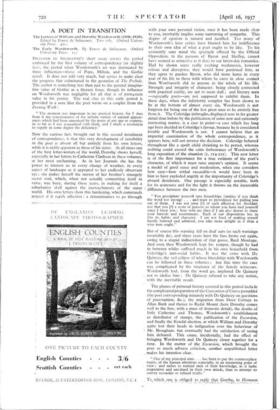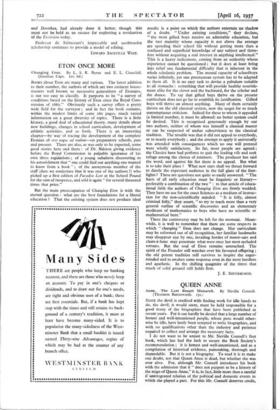A POET IN TRANSITION
The Letters of William and Dorothy Wordsworth (1806-1820). Edited by Ernest de Selincourt. Two vols. (Oxford Univer- sity Press. 42s.)
The Early Wordsworth. By Ernest de Selincourt. (Oxford University Press. Is.) PROUSSOR DE SELINCOURT'S short essay covers the period embraced by the first volume of correspondence (or slightly less), the period when Wordsworth's art was dominated by three influences—those of Pope, Milton, and the Gothic novel. It does not add very much, but serves to make clear the progress that culminated in the gestation of The Prelude. The author is something less than just to the general imagina- tive value of Gothic as a literary force, though its influence on Wordsworth was negligible for all that is of perrriment value in his poetry. The real clue to this early period is provided in a note that the poet wrote on a couplet from the Evening Walk : " The moment was important in my poetical history, for I date from it my consciousness of the infinite variety of natural appear-. ances which had been unnoticed by the poets of any age or country, in so far as I was acquainted with them, and I made a resolution to supply in some degree the deficiency."
Now the curious fact, brought out in this second instalment of correspondence, is that this very development of sensibility in the poet is absent all but entirely from his own letters, while it is richly apparent in those of his sister. At all times one of the best letter-writers of the world, Dorothy shows herself, especially in her letters to Catherine Clarkson in these volumes,
at her most enchanting. As in her Journals she has the power to interest us in every change of weather, in every
aspect of landscape as it appeared to her endlessly observant eye ; she makes herself the mirror of her brother's strangely secret soul, which, when not actually committing itself in verse, was busy, during these years, in making for itself a rebarbative shell against the encroachments of the outer world. His own letters show this hardening, which commands respect if it repels affection : a determination to go through with your own personal vision, once it has been made clear to you, inevitably implies some narrowing of sympathy. This degree of egotism is natural and justified. Too many of Wordsworth's later critics have blamed him for indifference to their own idea of what a poet ought to be like. To his eminently sane mind the spectacle offered by the Official Opposition, in the persons of Byron and Shelley, cannot have seemed as attractive as it does to our latter-day romantics. Had he shown some really exciting weaknesses, however odious and disruptive, they would have pardoned him, as they agree to pardon Byron, who did more harm in every year of his life to those with whom he came in close contact than Wordsworth did to anyone in the whole of his life. Strength and integrity of character, being closely connected with practical reality, are apt to seem dull ; and literary men —especially poets—are not supposed to exhibit them. In these days, when the inferiority complex has been shown to be at the bottom of almost every sin, Wordsworth is not forgiven for being one of the few great men to be entirely free from it. The Coleridge imbroglio, displayed now in far greater detail than before by the publication of some new and extremely interesting matter, is a case in point—a case which has long ago been decided in Coleridge's favour, because he is considered lovable and Wordsworth is not. I cannot believe that an impartial examination of the whole correspondence, as it appears here, will not reverse the decision. Coleridge behaved throughout like a spoilt child shrieking to be petted, whereas nothing could exceed the calm forbearance of Wordsworth's long exposition of the situation (1, 214-22i). This new letter is of the first importance for a true estimate of the poet's character, of which it must raise anyone's opinion. It seems a model of good sense and moderation, when one considers how easy—how withal excusable—it would have been in him to have exploded angrily at the importunity of Coleridge's absurd desiderata. One passage is especially notable, both for its acuteness and for the light it throws on the inexorable difference between the two men.
" You precipitate yourself into friendships (amities if you think the word too strong) . . . and trust to providence for pulling you out of them. I was not your [?] of such affection for Stoddart nor that you [?] a score of persons to whom you have tied yourself since I knew you ; bear with me then if I am also slower to share your hatreds and resentments. Each of our dispositions has in this its habits and character. I am not fond of making myself hastily beloved and admired, you take more delight in it than a wise man ought."
But of course this warning fell on deaf ears (as such warnings invariably do), and three years later the fuss broke out again, owing to a stupid indiscretion of that goose, Basil Montagu. And even then Wordsworth kept his temper, though he had in between whiles suffered much in his own household from Coleridge's anti-social habits. It was the same with Da Quincey, the sad eclipse of whose friendship with Wordsworth can be followed in these volumes ; but this time the case was complicated by the virulence of the female witnesses. Wordsworth had, from the word go, implored De Quincey not to idolise him ; De Quincey refused to take any notice, with the inevitable result.
The phases of personal history covered in this period incluie the complicated preparation of the Convention of Cintra pamphlet (the poet corresponding minutely with De Quincey on questions of punctuation, &c.), the migration from Dove Cottage to Allan Bank and thence to Rydal Mount (here Dorothy comes well to the fore, with a mass of domestic detail), the deaths of little Catherine and Thomas, Wordsworth's establishment as distributor of stamps, the publication of the Excursion,
and finally the Kendal election, at which William and Dorothy _ quite lost their heads in indignation over the behaviour of - Mr. Brougham, but eventually had the satisfaction of seeing him. defeated. This cause, incidentally, had the effect of
• - bringing Wordsworth and De Quincey closer together for a time. In the matter of the Excursion, which brought the poet so much adverse criticism, another unpublished letter makes his intention clear.
" One of my principal aims . . . has been to put the commonplace truths, of the human affections especially, in an interesting point of
- view ; and rather to remind men of their knowledge, as it lurks inoperative and unvalued .in their own minds, than to attempt to convey recondite or refined truths."
_ To which, one is obliged to reply th4t. Goethe, in .Hertnaltn • - - •
and Dorothea, had already done it better, though this must not be held as an excuse for neglecting a revaluation of the Excursion today.
Professor de Selincourt's impeccable and unobtrusive scholarship continues to provide a model of editing.
EDWARD SACKVILLE WEST.























































 Previous page
Previous page